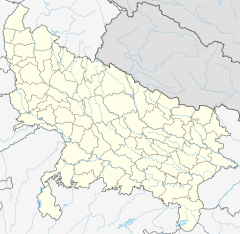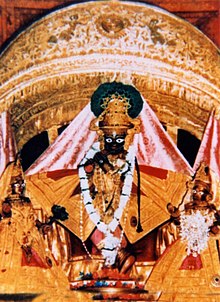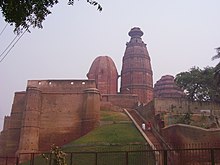| Shri Radha Madan Mohan Temple | |
|---|---|
 Outer structure of Radha Madan MohanTemple, Vrindavan. Outer structure of Radha Madan MohanTemple, Vrindavan. | |
| Religion | |
| Affiliation | Hinduism |
| District | Mathura |
| Deity | Radha Madanmohan |
| Festivals | Janmashtami, Radhashtami, Holi, Gopashtami, Sharad Purnima, Kartik Purnima |
| Location | |
| Location | Vrindavan |
 | |
| Geographic coordinates | 27°34′47″N 77°41′26″E / 27.57976°N 77.69051°E / 27.57976; 77.69051 |
| Architecture | |
| Style | Nagara |
| Founder | Sanatana Goswami, Kapur Ram Das |
| Completed | 1580 AD |
| Specifications | |
| Height (max) | 50 fts |
| Materials | Red stone |
Shri Radha Madan Mohan Temple, is a Hindu temple situated in Vrindavan of Indian state of Uttar Pradesh. It is one of the oldest and highly revered temple of Vrindavan. The presiding deity of the temple is Madan Mohan, a form of the god Krishna who is present in the central altar of the temple with his consort goddess Radha and Lalita gopi on either sides of him. The temple is one of the earliest temples of Vrindavan which has architectural influences from existing Mughal architecture and as well as Kalinga Nagara Style of Indian Temple Architecture.
The temple is built in the Nagara style of architecture. On the bank of Yamuna River, Radha Madan Mohan Temple stands at a height of 50 feet near Kaliya Ghat. It is also one of the most popular Goswami shrines in Uttar Pradesh.
History
According to popular folklore, Shri Radha Madan Mohan temple in Vrindavan is 5000 years old. It was first believed to be constructed by that the great-grandson of Krishna - Vajranabh. However, with the passage of time, deities were lost. Later, the deity of Madan Mohan was discovered at the base of an old banyan tree by Advaita Acharya, when he visited Vrindavan. He entrusted the worship of Madana Mohan to his disciple, Purusottama Chaube, who then gave the deity to Sanatana Goswami.
According to historical sources, it was in 1580 AD that this temple was rebuilt under the guidance of Sri Sanatana Goswami by a Multan trader Kapur Ram Das. As the temple was invaded by Mughal emperor Aurangzeb in 1670 AD, the original idol of Madan Mohan was secretly shifted to Jaipur by King Jai Singh overnight before the attack of Aurangzeb on Vrindavan and Mathura temples. Later, the deities are shifted to Karauli by King Gopal Singh. The original deities of Shri Radha Madan Mohan temple are presently installed in Madan Mohan temple of Karauli, Rajasthan.

The original deity of Madan Mohan is said to exactly resemble Krishna from the waist down. In 1748 AD, a replica of Madan Mohan was established in the Madan Mohan temple, Vrindavan. In 1819 AD, Nanda Kumar Basu, a zamindar from Baharu rebuilt the temple at the foot of the hill near Yamuna river. Presently, Shri Radha Madan mohan temple of Vrindavan houses the replica of original deities which are installed in the Madan Mohan temple, Karauli.
Architecture

Shri Radha Madan Mohan temple has Nagra style of architecture. It is built in oval shape with red sandstone. The temple is 20 meters high and is situated near river Yamuna.
Temple timings
The time zone (UTC+05:30) observed through India by the priest.
Winter Timings : Morning 7:00 am to 12:00 pm, Evening 4:00 pm to 8:00 pm.
Summer Timings : Morning 6:00 am to 11:00 am, Evening 5:00 pm to 9:30 pm.
Gallery
-
 Pencil art depicting Shri Radha Madan Mohan temple on banks of Yamuna, 1789.
Pencil art depicting Shri Radha Madan Mohan temple on banks of Yamuna, 1789.
-
 Madan Mohan Temple, 1795.
Madan Mohan Temple, 1795.
-
 Outer structure of Shri Radha Madan Mohan temple, Vrindavan.
Outer structure of Shri Radha Madan Mohan temple, Vrindavan.
-
 Interior of the Shri Radha Madan Mohan temple, a watercolor by Seeta Ram, c.1814-15.
Interior of the Shri Radha Madan Mohan temple, a watercolor by Seeta Ram, c.1814-15.
-
 Front view of temple.
Front view of temple.
-
 Devotees worshiping inside the premises of temple.
Devotees worshiping inside the premises of temple.
-
 Shri Radha Madan Mohan temple, Vrindavan 1789 painting.
Shri Radha Madan Mohan temple, Vrindavan 1789 painting.
Nearby attractions
- Kaliya Ghat
- Bankey Bihari Temple
- Radha Ramana Temple
- Nidhivan
- Seva Kunj
- Sanatana Goswami Samadhi
- Ashta Sakhi Temple.
See also
- Madan Mohan
- Madan Mohan Temple, Karauli
- Radha Krishna
- Sanatana Goswami
- Radha Damodar Temple, Vrindavan
- Radha Vallabh Temple, Vrindavan
- Radha Krishna Vivah Sthali, Bhandirvan
References
- Mukherjee, Tarapada; Habib, Irfan (1988). "The Mughal Administration and the Temples of Vrindavan During the Reigns of Jahangir and Shahjahan". Proceedings of the Indian History Congress. 49: 287–300. ISSN 2249-1937. JSTOR 44148393.
- Prasad, Pushpa (2002). "Vrindaban in Eighteenth Century: Side Lights from Nagari Documents". Proceedings of the Indian History Congress. 63: 415–422. ISSN 2249-1937. JSTOR 44158110.
- MUKHERJEE, TARAPADA; HABIB, IRFAN (1987). "Akbar and the Temples of Mathura and its Environs". Proceedings of the Indian History Congress. 48: 234–250. ISSN 2249-1937. JSTOR 44141685.
- ^ "Madan Mohan Temple, Vrindavan - Timings, History, Pooja & Aarti schedule". Trawell.in. Retrieved 2 July 2021.
- "Shri Radha Madan Mohan Temple". Braj Ras - Bliss of Braj Vrindavan. Retrieved 2 July 2021.
- Anand, D. (1992). Krishna: The Living God of Braj. Abhinav Publications. p. 99. ISBN 978-81-7017-280-2.
- Bharti, Sushant (26 March 2024). Madan Mohan: An Enchanting Saga. Simon and Schuster. ISBN 979-8-88762-100-5.
- ^ "Sri Radha Madan Mohan Temple Vrindavan | Temple History & Best Time to Visit". tour-my-india. Retrieved 2 July 2021.
- "Sri Sri Radha Madan Mohan Temple". iskcondesiretree.com. Retrieved 2 July 2021.
- ^ "Shri Radha Madan Mohan Mandir | श्री राधा मदन मोहन मंदिर | Vrindavan Uttar Pradesh | About, Aarti, Timings, Photo, How to Reach". BhaktiBharat.com. Retrieved 2 July 2021.
- "Madan Mohan Temple Vrindavan (Timings, History, Entry Fee, Images, Aarti, Location & Phone) - Vrindavan Tourism 2021". vrindavantourism.in. Retrieved 2 July 2021.
